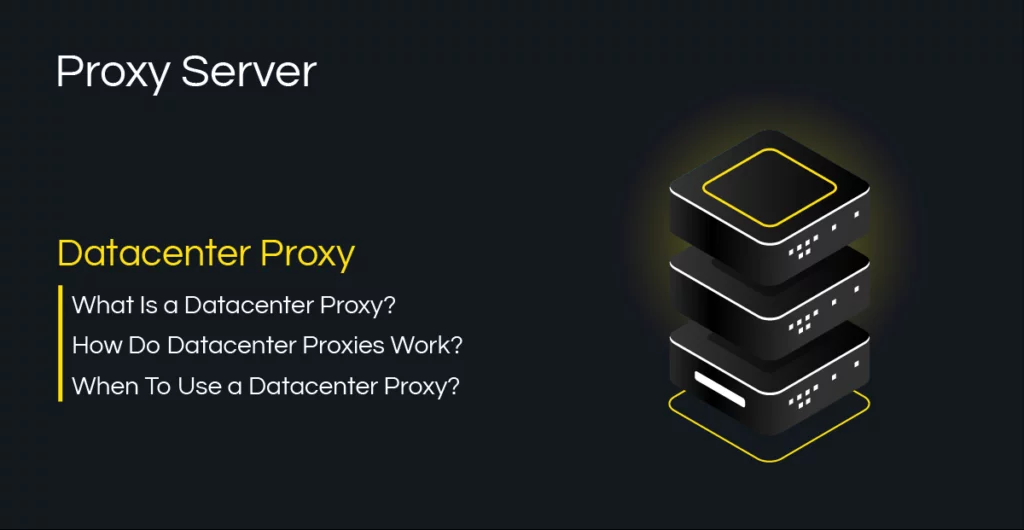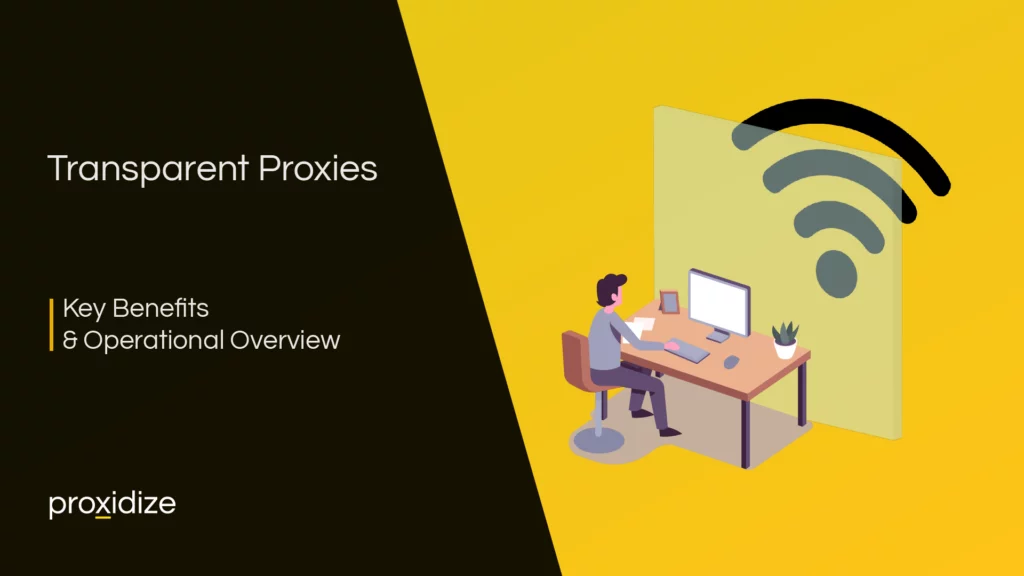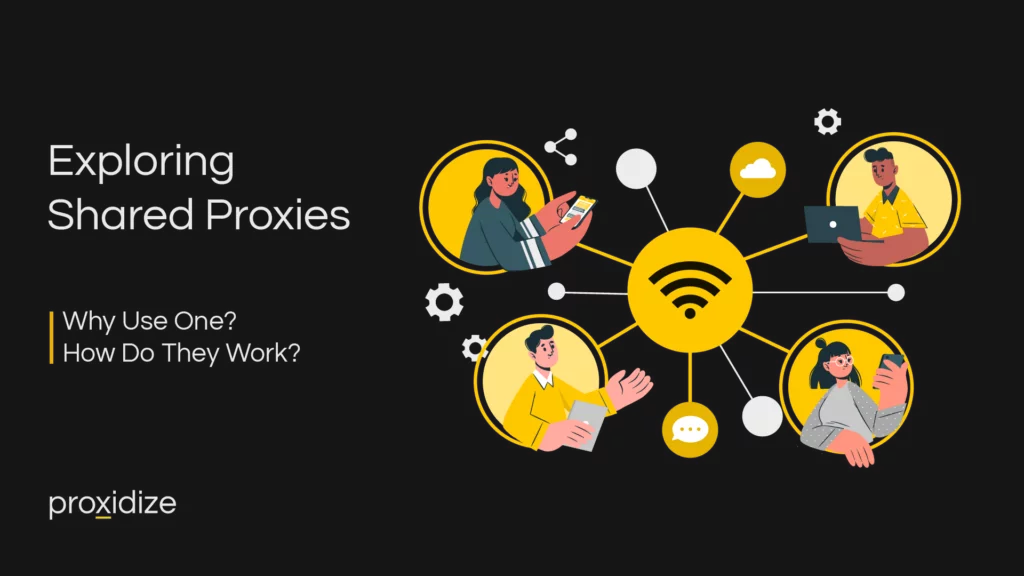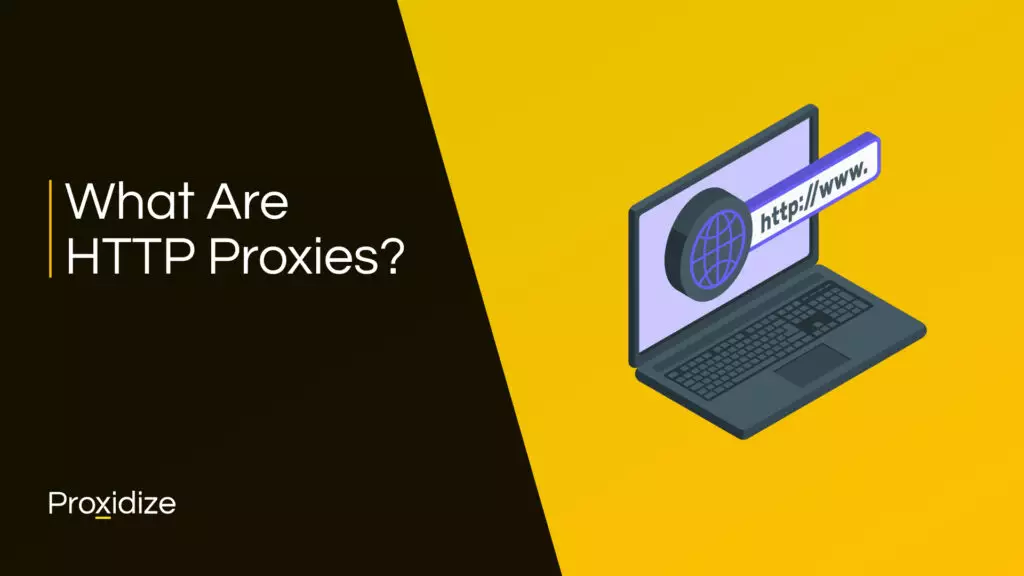Datacenter proxies are intermediary servers that source their IP from a data center. They forward and receive traffic on your behalf, lending you their IP and geolocation while surfing the internet. This sets them apart from residential proxies, which source their IPs from those assigned to a home by an internet service provider (ISP), or mobile proxies, which source their IP from mobile carriers via a SIM card.
In this article we’ll explore what datacenter proxies are, how they work, what sets them apart from their residential and mobile counterparts, and what advantages and disadvantages their data center origin offers them.

Where Does a Datacenter Proxy Get Its IP From?
Datacenter proxies source their IP addresses from data centers, facilities operated by businesses that house servers and network infrastructure. This infrastructure is used to host websites and cloud applications and services. Data center operators are generally hosting companies, cloud service providers and other businesses that require a large number of IPs for commercial use.
A proxy provider can set up a data center in order to offer its clients datacenter proxies. When you use a datacenter proxy, you’re connecting to a proxy server at the datacenter, routing your internet traffic through it.

How Do Datacenter Proxies Work?
As with all proxies acting as anonymizing technology, the way a datacenter proxy works is similar to its residential and mobile counterparts.
First, the client (the device or application) has to be configured to route its traffic through the proxy. This typically means providing it with the proxy’s IP address, port number, and a user and password.
Then the client initiates a request for something on the internet, like loading a webpage. Instead of sending that data directly to the target server, the request is sent to the proxy server. The request includes information related to the target server.
Next, the proxy server accepts the request from the client and establishes a connection to the target server using its own IP address. The target server processes the request as it would for any client and sends a response back to the proxy server.
The proxy server receives the response from the target server and can make any adjustments it’s been programmed to make, although if it’s being used for anonymity it does not make any changes.
The client receives the response from the proxy server; in this case it loads the requested webpage. From the client’s perspective, everything is working as normal (perhaps a bit slower as the request and response has had to travel further), and from the target server’s perspective, it has fulfilled a request made by a datacenter client.

What Are the Pros and Cons of Datacenter Proxies?
Where a proxy server sources its IP from imparts on it the qualities of that IP. Datacenter IPs are no exception. Data centers are for commercial use and therefore generally enjoy enterprise-grade hardware like high-quality servers and infrastructure. Datacenter IPs are generally static, which lends itself better to certain use cases. Let’s take a deeper look at the pros and cons of datacenter proxies.
Datacenter Proxy Advantages
High Speed & Unlimited Bandwidth: Datacenter proxies are known for their excellent speed and low latency. Many providers offer unlimited bandwidth and minimal response time. Datacenter proxies benefit from the high–bandwidth infrastructure of data centers; high-quality proxy infrastructure means a shared datacenter proxy doesn’t necessarily take as much of a bandwidth hit from handling multiple connections. This makes them ideal for tasks that require quick data transmission, such as search engine optimization and performance testing.
Scalability: Data centers have access to a large pool of IPs and as such providers are able to offer a large quantity of datacenter proxies. This makes scaling up and down as needed much more convenient.
Affordable Price: Compared to residential or mobile proxies, data center proxies are generally more affordable, as datacenter IPs are plentiful and cheaper to acquire for proxy providers compared to the alternatives. Residential IPs require a homeowner to acquire one through an ISP and a mobile IP needs to be sourced from a mobile provider — both are by comparison much more difficult to do in bulk.
Static IPs: Datacenter proxies have relatively static IPs for a whole range of reasons relating to internal network management and convenience. Additionally, data centers host websites, applications, databases, and other services that need to be reliably accessed at the same IP.
Wide Range of Locations: There are many data centers across the planet. This means that buyers are spoiled for choice when it comes to location. Getting an exact figure for how many exist is difficult, but according to Statista, there were 10,331 data centers worldwide in March 2024. They are, as one might expect, overwhelmingly located in the United States.
Reliable Connections & Load Balancing: Due to their centralized location and enterprise-grade infrastructure, datacenter proxies provide reliable connections with minimal downtime. Advanced features like load balancing ensure that multiple connection requests are handled efficiently, making them suitable for automation tools and applications requiring concurrent connections.
Datacenter Proxy Disadvantages
Easier Detection: Data centers are commercial entities and IPs they use are registered as such. This makes it easier for websites to detect them, which could be argued lowers one’s online anonymity. As part of websites’ fraud detection, connections that deviate from the “norm” of real users surfing the web from their home or phone will raise red flags.
Not Suitable for Geo-Restrictions: While data centers exist worldwide in large numbers, they are often concentrated in favorable areas. This means that your choices of locations may not be as granular as from alternatives. Furthermore, some websites and services outright block connections from known data center locations.
Potential IP Blocks: As stated, the more a connection deviates from the norm, the greater the chance a website blocks that connection. Datacenter IPs are granted limited leeway as they are already on a site’s antifraud radar. This lowers the barrier to rate-limiting and IP blocks for behavior that wouldn’t elicit such a response from residential or mobile IPs.
Shared IPs: Given that datacenter IPs are more static and access to them is shared or IPs are leased out to many people, over time cross-contamination is inevitable. This means that the activity of one user can impact the activities of another, particularly on popular sites.
Not Ideal for High-Trust Tasks: For tasks that require a high level of IP authenticity, data center proxies in and of themselves may not meet the standard for certain websites to any degree. This is particularly true of websites that have heightened security measures or are subject to regular attacks, fraud, or automation and have rigorous processes to prevent them.
In summary, data center proxies shine in terms of speed, scalability, and cost-effectiveness. If the website(s) you’re targeting are sufficiently charitable towards commercial connections, they are a great way to get good results quickly and cheaply.
However, they may not be the ideal choice for tasks that demand a high level of IP authenticity or for activity on websites that have strict anti-proxy or anti-bot systems. On the bright side, a datacenter IP is cheap enough that you can find out for yourself whether it will be blocked without committing a large amount of money.
What Types of Datacenter Proxies Are There?
Static & Rotating Datacenter Proxies
Static IPs make no effort to change or refresh; as datacenter IPs are inherently more static, this represents the largest portion of available datacenter IPs. Rotating IPs automatically change after set intervals or after a certain number of requests — including after each request. Using a rotating IP can offset some of the increased risk of being blocked inherent to datacenter proxies.
Shared & Dedicated Datacenter Proxies
Shared IPs are those used by several people at once. Dedicated IPs are those leased to only one person at any given time. Some proxy providers offer semi-dedicated IPs, which are leased to only a handful of people (3–5) at any given time to minimize the chance of overlapping activities. The tradeoff is cost, as dedicated proxies are more expensive.
HTTP/HTTPS & SOCKS Datacenter Proxies
An HTTP proxy supports HTTP and HTTPs web traffic. An HTTPS proxy encrypts the web traffic as it travels between the client and the proxy server. These are most commonly used for web scraping and web automation. A SOCKS proxy, by contrast, can manage more than just HTTP traffic, including UDP.
Backconnect Datacenter Proxies
A backconnect proxy provides a single access point that routes incoming requests through a large IP pool. This has an end result similar to IP rotation but at a much larger scale.

Common Use Cases for Datacenter Proxies
Web Scraping and Web Automation
Web automation is the process of using software referred to as bots to perform pre-defined actions, tasks, and processes on a web browser or web application. This can range from anything from filling out forms and clicking buttons and elements to testing an application and sending messages on social media.
Web scraping is the automated process of extracting data from a website. Web scraping falls under the umbrella of automation, as do all of the following use cases.
Social Media Automation and Management
Datacenter proxies are widely used for social media automation, enabling users to manage multiple accounts without being flagged by platforms. The high-speed internet connections and static IP addresses provide the necessary stability and layer of anonymity for these activities.
Price Monitoring and Review Monitoring
E-commerce businesses use datacenter proxies for price monitoring and review monitoring to stay competitive and understand customer feedback. The proxies’ ability to handle numerous requests simultaneously makes them ideal for gathering data from various sources.
A concrete example of this could be automatically checking recent reviews for positive or negative keywords to measure what aspect of a competitor’s product that customers like.
Performance Testing and App Testing
Developers leverage datacenter proxies for performance testing and mobile app testing. The reliable connections and high-speed servers allow for accurate simulation of user experiences across different geographic locations.

Datacenter Proxies vs Residential & Mobile Proxies
As we’ve previously touched on, where a proxy sources its IP from imparts on it the characteristics of its origins, including network infrastructure.
IP Sourcing
In terms of origins, a datacenter proxy sources its IP from data centers, which are allocated IPs in bulk. While this results in large proxy pools, these IPs are publicly known, which makes it straightforward for a website to determine that an incoming connection is coming from a data center. While this doesn’t usually result in an immediate block, the website is generally more likely to throw up anti-bot measures like CAPTCHAs and take action sooner.
A compromise solution is an ISP proxy, which is an ISP-assigned IP that is hosted on datacenter servers. It has the increased legitimacy of a residential proxy while enjoying the infrastructural benefits of a data center proxy server.
Trust Level
By comparison, residential IPs are sourced from a homeowner who has signed a contract with an ISP. This represents the overwhelming majority of incoming connections to a website. This makes it inherently less likely to trigger anti-bot measures, as websites want to facilitate a smooth experience for normal users. The same is true for mobile IPs, which access the internet via mobile carriers. This means they benefit from the characteristics of mobile infrastructure, making them much less likely to be blocked.
Speed
In terms of bandwidth and latency, data centers’ sole purpose is to facilitate the best possible internet connection speeds which means datacenter proxies tend to be fast. Residential and mobile proxies are limited by what ISPs and mobile carriers offer their customers, which can differ greatly between countries and providers.
Price
The proxy type also impacts the price, as data centers are allocated a large number of IPs in bulk while each residential and mobile proxy is generally set up separately. The price of data can also vary greatly. As this study by Statista shows, the price of 1GB of mobile data can be as little as $0.23 in France and as much as $12.55 in South Korea.
Geolocation Diversity
The diversity of geolocations also varies greatly between proxies. While data centers exist all over the world, they lack the granularity that residential proxies enjoy, i.e. with residential or mobile proxies you can easily specify an exact city you’d like your proxy to be located in, while data center proxies may not give you that option.
All of this results in each type of proxy lending itself better to specific use cases. Datacenter proxies are a natural choice for operations that require transfers of large amounts of data efficiently as well as large-scale projects involving web scraping and automation that target websites with less strict proxy detection.

Can I Use Free Datacenter Proxies?
A free proxy can be very tempting, but remember the internet truism: If the product is free, you are the product. We go into greater detail in this dedicated article on the dangers of free proxies, but suffice it to say that they offer no guarantees of quality or safety.
Free proxies have been known to log their users’ activity, lead to identity theft, inject ads into proxy users’ browsing experience, and outright block HTTPS connections. Any product or service that goes out of its way to block the user from using encryption should be viewed as hostile.
This is to say nothing of their slow speeds, inconsistent uptime, or whether they’re online at all. On top of that, contamination is unavoidable with so many users sharing the same limited number of public, free datacenter proxies.
Conclusion
Datacenter proxies are proxy servers that source their IPs from data centers. This provides them with high-speed connections, scalability, and attractive pricing. This makes them a great choice for web scraping and web automation that targets websites that are more forgiving of non-residential IPs. While they don’t enjoy the same authenticity of real IP addresses issued by an ISP or mobile carrier, they are a cheap way to acquire a large proxy pool.
Datacenter proxies are defined by:
- Speed
- Reliability
- Price
Although they do suffer from some drawbacks, notably their increased likelihood of being blocked, these can be mitigated by using rotating and dedicated datacenter proxies.
Datacenter IPs’ more static nature also requires some consideration. On the one hand, it lends itself well to contexts in which connecting from a consistent IP is beneficial, such as social media management. For situations in which a rapidly rotating IP is better, one can rotate through a large proxy pool for much cheaper than other proxy types.






